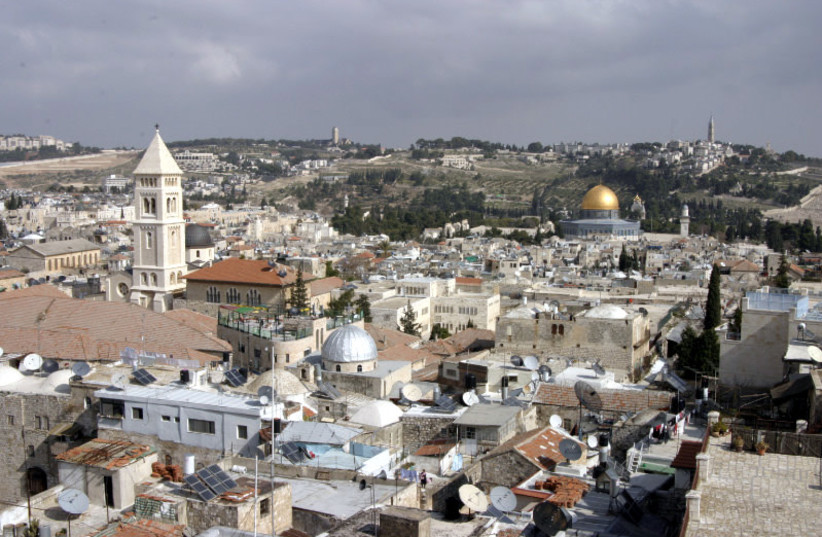Tzruya at Hazvi
Not every synagogue congregation has a permanent rabbi, or even a volunteer from among the congregants who has rabbinical ordination and is willing to give a lesson or two during the week and a sermon on Saturdays.
It doesn’t make those without a spiritual leader less observant, and it usually applies to small congregations that do not have the means to pay a respectable monthly salary.
The Hazvi Yisrael congregation in Talbiyeh had a rabbi for years, and then briefly found itself without one, but employed a new one fairly quickly. After five years, the congregation and the rabbi parted company, but it has taken much longer this time to find a successor.
However, there’s no shortage of retired rabbis among the congregants, and some of them have been temporarily put back to work on a voluntary basis from time to time.

Meanwhile, a search committee put out a call for candidates, and there were more than anticipated – all of them with excellent credentials, which made narrowing the field a difficult proposition.
But finally the committee cut down the list to three finalists, each of whom is fluent in Hebrew and English. Three-quarters of the congregants are from English-speaking countries, and most speak Hebrew quite well.
The three finalists are rabbis Avishai Tzruya, Shimshon Nadel, and Avi Baumol.
The idea is that each of them come on different weeks to a Shabbat service in which they will participate by reading from the Torah and delivering a bilingual sermon, and then attend a light kiddush to meet congregants in a less formal environment.
Tzruya was the first last Saturday, arriving with three generations of his family.
A symbol of the times in which we live was the fact that his son had a rifle slung over his prayer shawl.
Tzruya, a native-born Israeli, is 50 years old, a man who smiles easily and is very polite, and is visibly an affectionate father and grandfather.
Regardless of whether he or one of the other two finalists is chosen, whoever it is will have his work cut out for him, as Hazvi Yisrael has three services on different floors. They all start at different times, but parts of the services overlap.
Tzruya, who is a rosh yeshiva at Ateret Kohanim Yeshiva in the Old City, recently completed a month’s reserve duty in the army and is a strong believer in combining Torah study with military service.
■ ALTHOUGH IT would be expected of a senior rabbi to be a walking example of tolerance, acceptance, and goodwill, not all rabbis fit the bill. Rabbi Shlomo Moshe Amar, the chief rabbi of Jerusalem and former chief rabbi of Israel, committed one of the big sins in the book: He publicly embarrassed a senior civil servant of the State of Israel, refusing to shake hands with Knesset Speaker Amir Ohana because Ohana is gay.
It’s not as if being gay is contagious. Yes, it’s a biblical no-no, but social norms have changed, and there are even gay groups within Orthodox circles. The chief rabbi is also a civil servant whose salary comes from the state coffers. One wonders whether, if his life were in danger, he would agree to be treated by a gay physician.
Campus antisemitism
■ CAMPUS ANTISEMITISM and anti-Zionism have no geographic boundaries and are therefore not limited to North America and Europe. Australian Jewish students at schools and in universities are also subjected to harassment and violence.
Steven Prawer, a professor of physics at the University of Melbourne, where he undertakes research into quantum computing and brain-machine interfaces, will speak about rising antisemitism and anti-Israelism Down Under. Place and time: The Jerusalem Anglo Women’s Rosh Hodesh Lunch Club on Sunday, June 9, at 12:45 p.m., at Kehillat Mevakshei Derech, 22 Shai Agnon Boulevard, San Simon.
Doors open from 12:30 p.m. onward. Entrance fee is NIS 50 (payable by cash only) and includes a light catered lunch, with gluten-free bagels and salads on request. Such bagels and salads are only for those people whose names are on these items, and will be distributed together with name tags during entry fee payment. Registration by Tuesday, June 4, at roshhodeshwomen@gmail.com/, is mandatory.
Anyone who does not receive confirmation of registration should be aware that her registration did not arrive. Due to limited space, people who have not registered cannot be admitted.
Due to food ordering costs, a cancellation fee of NIS 25 will be applied to anyone registered who is unable to attend.
greerfc@gmail.com
